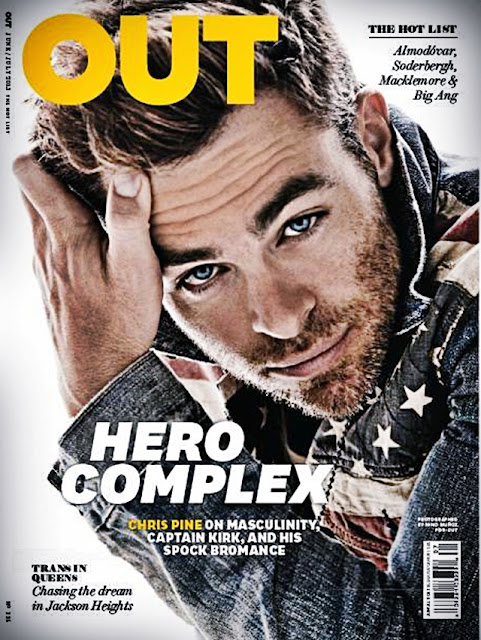Star Trek Into Darkness star Chris Pine photographed by Nino Muñoz for Out magazine’s June/July 2013 issue.
Here’s what the 32-year-old actor had to share with Out:
On what former tough guys on the silver screen represented
You take someone like a Bruce Willis or a Charles Bronson -- the definition of masculinity there becomes about the ability to inflict violence, take revenge, take what’s yours. I’m thinking in my mind about Clint Eastwood squinting with the gun in Dirty Harry. Not smiling, squinting -- very cold and cut off.
On Tom Hardy as the new Marlon Brando
But then you have Marlon Brando in The Wild Bunch. In Streetcar Named Desire or Last Tango [in Paris]. Or Tom Hardy, I think, has it -- this ability to inflict incredible violence in the blink of an eye, but then also to cry and to show great vulnerability. Those two polarities are in many ways indicative of the human experience in its most extreme.
On his first time playing gay
My first intimate scene [onscreen] was with Tom Everett Scott,” Pine says, referring to his role in the TV movie-of-the-week, Surrender, Dorothy, with Diane Keaton, in which he plays gay. “He’s an incredible spooner -- very warm, very sensitive.
On the photography for Out's June/July cover shoot
I liked the Avedonian vibe—how it becomes purely about the architecture of the shot.
On the last novel he remembers finishing, Jennifer Egan’s Pulitzer Prize–winning A Visit From the Goon Squad
[It] blew my mind -- the melancholy of time passing, of regret, of moments lost” -- and has been trying to find time to concentrate on Water Music by T.C. Boyle. (“His imagination is stunning, and his command of language is -- I’m just circling words.”)
How his four-year English degree from Berkley contributed to a kind of critical speed-read technique
I think I’ve read 20 scripts in the last two and a half weeks. Those tools are indispensable, all those little micro-muscles in your brain that are just trained to see certain things. All you do all day is read, break down story, structure, character, and technique.
On co-star Zachary Quinto's sexuality
It was something that I knew about Zach from the moment I met him. It was just who Zach was and that’s that. I’m sensitive, and I don’t ever want to make anyone feel uncomfortable. Knowing that for Zach it was more about a career thing and that he was not comfortable at the time coming out -- it was fine. It was something that we kind of tiptoed around and I just took it as a given, because that’s what he wanted.
On co-star Zachary Quinto coming out
So happy for him, oh man, I thought it was rad. It was really, really cool. He did it on his own time, on his own schedule. And Jonathan [Groff], who he’s dating, is such a lovely man. He’s a good guy and a great actor, and they make a fantastic couple. I couldn’t have been happier for Zach.
On playing Tom Clancy's Jack Ryan character in the upcoming Hollywood prequel
The books were written at the end of the Cold War,” he says diplomatically, “and it was seemingly much easier to paint the good guys and the bad guys.
On the homogenization of male movie stars
I think there is a growing homogenization of what masculinity means. In the late ’60s and early ’70s, you had John Cazale, you had Pacino, DeNiro, Hoffman, Voight, Elliott Gould. Look at Gene Hackman. Look at all those pictures on a wall; they could not be any more different from one another, and they were all major stars. They could not have been more different in terms of aesthetic, in terms of energy, talent -- all of it. And now…
On wanting to be in Ryan Murphy’s HBO adaptation of The Normal Heart
I would have done that in a fucking heartbeat. Right now I just want to play good roles, and if the role happens to be a gay man, that’s not of any import other than is it a good story? Does it say something that’s interesting?






